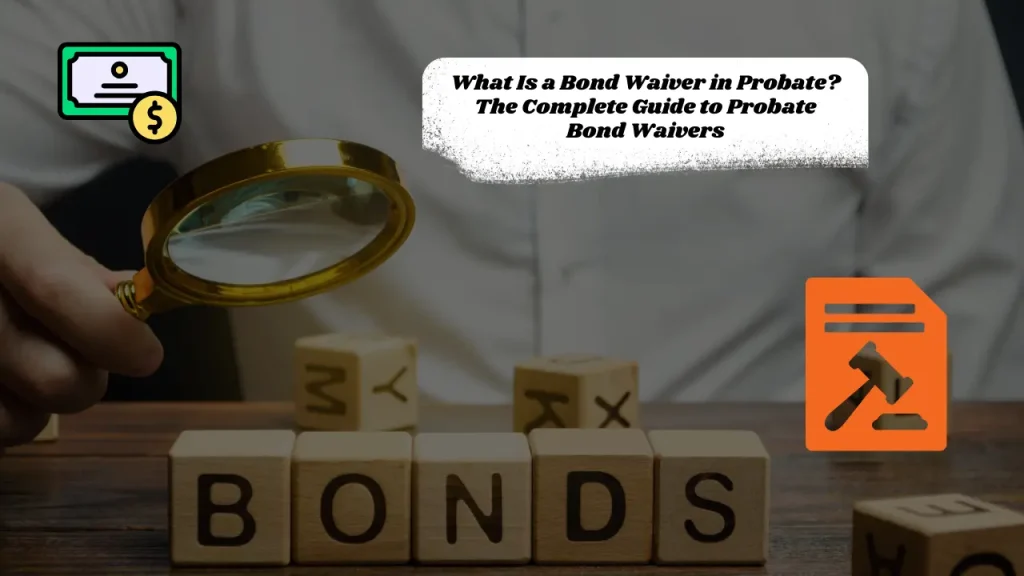What Is a Bond Waiver in Probate? The Complete Guide to Probate Bond Waivers
Did you know that over 70% of executors in the U.S. pay thousands of dollars for probate bonds they might not even need? A bond waiver could save you time, money, and stress—but only if you know how to secure one. This guide will walk you through everything you need to know about bond waivers in probate, from state-specific laws to step-by-step instructions.
Table of Contents
What Is a Probate Bond?
A probate bond, also known as a fiduciary bond, is a type of insurance policy required by courts to protect beneficiaries and creditors if an executor mishandles estate assets. These bonds typically cost 1–6% of the estate’s value annually, depending on the executor’s creditworthiness and the size of the estate.
Example: For a $1 million estate in Texas, the bond could cost $10,000–$60,000 per year—money that could otherwise go to the heirs.
What Is a Bond Waiver in Probate?
A bond waiver is a court order that allows an executor to serve without posting a probate bond. Courts grant waivers under specific conditions, such as:
- The will includes a “no-bond” clause (common in states like Florida, California, and Illinois).
- All beneficiaries consent to waiving the bond (per Uniform Probate Code § 3-603).
- State law exempts certain estates (e.g., small estates under $50,000 in Ohio Revised Code § 2113.15).
Key Benefit:
A bond waiver eliminates the cost and hassle of securing a bond, allowing executors to focus on administering the estate.
How to Secure a Bond Waiver: A Step-by-Step Guide
1. Review the Will for a “No-Bond” Clause
Look for language like:
“My executor shall serve without bond or surety.”
- In states like New York (EPTL § 11-1.6), a will’s waiver overrides objections unless fraud is suspected.
2. File the Required Forms
Each state has specific forms for bond waivers. Here are a few examples:
- California: Submit Form DE-141 with your probate petition.
- Florida: Use Form 5.420 and include notarized beneficiary consent.
- Texas: File Form PR-201 within 120 days of appointment.
3. Obtain Unanimous Beneficiary Consent
If the will doesn’t waive the bond, you’ll need consent from all beneficiaries.
- Use a notarized affidavit to streamline the process.
4. Attend a Hearing (If Required)
Some states, like Arizona, require a court hearing for bond waivers. Bring:
- A copy of the will.
- Estate inventory.
- Signed consent forms.
5. Submit the Waiver Order to the Court
Once approved, file the waiver order with the probate clerk to finalize the process.
Pro Tip: In Illinois (755 ILCS 5/6-13), estates under $100,000 automatically qualify for waivers—no court petition needed.
When Can’t You Waive the Bond?
While bond waivers are helpful, they aren’t always an option. Here are four scenarios where a bond is typically required:
- Hostile beneficiaries: If even one heir objects, the court may deny the waiver.
- Estate debts exceed assets: Creditors need the bond’s protection.
- Executor has a criminal record: Courts often deny waivers in these cases.
- State-specific rules: For example, Nevada (NRS 139.010) requires bonds for estates over $100,000.
Alternative:
If a waiver isn’t possible, consider petitioning for a reduced bond amount using estate assets as collateral.
Related article for you:
How to Fill Out California Probate Code Section 13100 (Without Losing Your Mind)

State-by-State Bond Waiver Rules
| State | Key Law/Code | Forms Needed | Unique Rules |
| California | Probate Code § 8480 | DE-141 | Waiver allowed for small estates (<$166k) |
| Texas | Estates Code § 305.002 | PR-201 | Will waiver overrides all objections |
| New York | EPTL § 11-1.6 | BMC-874 | All beneficiaries must consent |
| Florida | Probate Rule 5.235 | 5.420 | Heirs can revoke consent mid-case |
Local Insight: In Georgia (OCGA § 53-6-50), out-of-state executors cannot waive bonds.
Risks of Not Securing a Bond Waiver
Skipping a bond waiver can lead to:
- Personal liability: Executors may pay out-of-pocket for errors or mismanagement.
- Higher costs: Bond premiums drain estate funds that could go to heirs.
- Delays: Bond underwriting can take 2–8 weeks, slowing down probate.
Example: A Florida executor paid $8,000 in bond fees for a 6-month probate case—money that could’ve gone to the heirs.
FAQs About Bond Waivers
Can I get a waiver if the will doesn’t mention it?
Yes, but you’ll need unanimous beneficiary consent.
How long does a waiver take?
Fast: 7 days (Texas, if the will has a waiver clause).
Slow: 60 days (New York, requires a hearing).
What if a beneficiary lives out of state?
They can sign a remote notarized affidavit (valid in 48 states).
Are waivers permanent?
No. Courts can revoke them if the executor acts improperly
Resources for Executors
State Probate Forms:
- California Courts
- Texas Law Help
Legal Aid:
- Legal Services Corporation (low-income help)
- AARP Probate Assistance (seniors)
Tools:
- Estate Executor Checklist (download here)
- Probate Bond Calculator (link)
Final Checklist for Securing a Bond Waiver
Review the will for a “no-bond” clause.
Contact beneficiaries for consent (use email templates).
File state-specific forms + pay fees ($50–$300).
Attend hearing (if required).
Submit waiver order to the court.
Pro Tip: In Ohio (Revised Code § 2113.15), estates under $50,000 automatically qualify for waivers.
About the Author

Sarah Klein, JD, is an experienced estate planning attorney who has helped clients with wills, trusts, powers of attorney, and probate matters. At All About Lawyer, she simplifies complex estate laws so families can protect their assets, plan ahead, and avoid legal headaches during life’s most sensitive moments.
Read more about Sarah

Good explanation of how bond waivers work. One point worth adding is that courts may still require a bond if there are concerns about debts or disputes among heirs, even when a waiver is requested. For those looking at state-specific probate bond rules and court requirements, https://www.ProbateCourtBond.com/court
has a helpful directory.